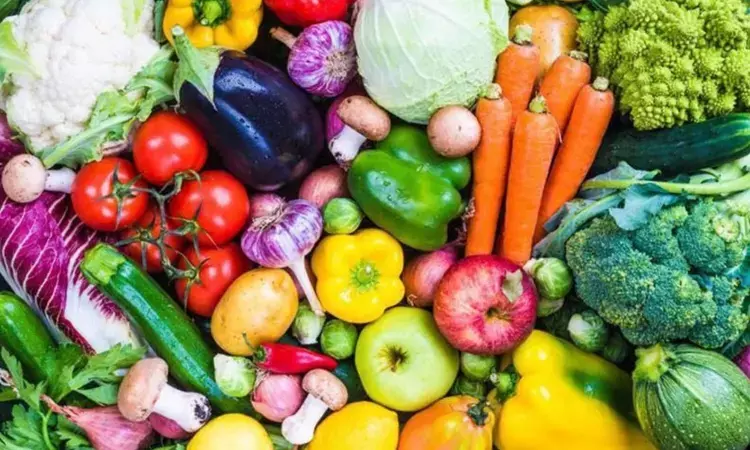- Home
- Medical news & Guidelines
- Anesthesiology
- Cardiology and CTVS
- Critical Care
- Dentistry
- Dermatology
- Diabetes and Endocrinology
- ENT
- Gastroenterology
- Medicine
- Nephrology
- Neurology
- Obstretics-Gynaecology
- Oncology
- Ophthalmology
- Orthopaedics
- Pediatrics-Neonatology
- Psychiatry
- Pulmonology
- Radiology
- Surgery
- Urology
- Laboratory Medicine
- Diet
- Nursing
- Paramedical
- Physiotherapy
- Health news
- Fact Check
- Bone Health Fact Check
- Brain Health Fact Check
- Cancer Related Fact Check
- Child Care Fact Check
- Dental and oral health fact check
- Diabetes and metabolic health fact check
- Diet and Nutrition Fact Check
- Eye and ENT Care Fact Check
- Fitness fact check
- Gut health fact check
- Heart health fact check
- Kidney health fact check
- Medical education fact check
- Men's health fact check
- Respiratory fact check
- Skin and hair care fact check
- Vaccine and Immunization fact check
- Women's health fact check
- AYUSH
- State News
- Andaman and Nicobar Islands
- Andhra Pradesh
- Arunachal Pradesh
- Assam
- Bihar
- Chandigarh
- Chattisgarh
- Dadra and Nagar Haveli
- Daman and Diu
- Delhi
- Goa
- Gujarat
- Haryana
- Himachal Pradesh
- Jammu & Kashmir
- Jharkhand
- Karnataka
- Kerala
- Ladakh
- Lakshadweep
- Madhya Pradesh
- Maharashtra
- Manipur
- Meghalaya
- Mizoram
- Nagaland
- Odisha
- Puducherry
- Punjab
- Rajasthan
- Sikkim
- Tamil Nadu
- Telangana
- Tripura
- Uttar Pradesh
- Uttrakhand
- West Bengal
- Medical Education
- Industry
New Study Reveals Associations of Vegetable and Potato Intakes With Type 2 Diabetes Risk

Australia: In a groundbreaking study, researchers from the Australian Diabetes, Obesity, and Lifestyle (AusDiab) study have uncovered significant associations between vegetable and potato consumption and markers of type 2 diabetes (T2D) risk. The findings provide valuable insights into the role of diet in influencing diabetes risk factors, offering potential avenues for preventive strategies and dietary interventions.
The study found that a higher vegetable intake, particularly, green leafy vegetables, may improve, while consuming potato chips/fries, but not potatoes prepared healthily may worsen insulin sensitivity and glucose tolerance.
The findings, published in The Journal of Clinical Endocrinology & Metabolism, suggest a nuanced relationship between vegetable subgroups and their impact on glucose tolerance.
The associations of vegetable and potato intakes with T2D appear to be nuanced, depending on vegetable types and preparation methods, respectively. Pratik Pokharel, Edith Cowan University, Perth, Western Australia, Australia, and colleagues aimed to investigate the associations of total vegetable, vegetable subgroup, and potato intakes with (1) markers of type 2 diabetes at baseline and (2) incident T2D cumulative over a follow-up period of 12 years in Australian adults.
For this purpose, the researchers assessed vegetable and potato intakes via a food frequency questionnaire at baseline using data from the Australian Diabetes, Obesity and Lifestyle Study.
Associations between vegetable intake and (1) fasting plasma glucose (FPG), updated homeostasis model assessment of β-cell function (HOMA2-%β), HOMA2 of insulin sensitivity (HOMA2-%S), 2-hour post-load plasma glucose (PLG), and fasting insulin levels at baseline; and (2) they examined cumulative incident T2D at the end of 12-year follow-up using generalized linear and Cox proportional hazards models, respectively.
The study revealed the following findings:
- 8009 participants were included, having a median age of 52 years, and a vegetable intake of 132 g/day.
- Higher intake of total vegetable, green leafy, yellow/orange/red, and moderate intakes of cruciferous vegetables was associated with lower PLG.
- Higher green leafy vegetable intake was associated with lower HOMA2-%β and serum insulin.
- Higher potato fries/chips intakes were associated with higher FPG, HOMA2-%β, serum insulin, and lower HOMA2-%S.
- Participants with moderate cruciferous vegetable intake had a 25% lower risk of T2D, at the end of 12 years of follow-up.
"Our study findings suggest that a diet rich in vegetables, in particular, cruciferous, green leafy, and orange/yellow/red vegetables may help improve glucose tolerance in Australian adults. Moreover, a diet rich in green leafy vegetables might improve insulin sensitivity," the researchers wrote. "Conversely, a higher potato fries/chips intake, but not potatoes prepared healthily, may worsen glucose tolerance and insulin sensitivity."
"These findings indicate a nuanced relationship between vegetable subgroups, insulin sensitivity, and glucose tolerance," they concluded.
Reference:
Pokharel, P., Blekkenhorst, L. C., Bondonno, C. P., Murray, K., Magliano, D. J., Daly, R. M., Shaw, J. E., Lewis, J. R., Hodgson, J. M., & Bondonno, N. P. Associations of Vegetable and Potato Intakes With Markers of Type 2 Diabetes Risk in the AusDiab Cohort. The Journal of Clinical Endocrinology & Metabolism. https://doi.org/10.1210/clinem/dgae333
Dr Kamal Kant Kohli-MBBS, DTCD- a chest specialist with more than 30 years of practice and a flair for writing clinical articles, Dr Kamal Kant Kohli joined Medical Dialogues as a Chief Editor of Medical News. Besides writing articles, as an editor, he proofreads and verifies all the medical content published on Medical Dialogues including those coming from journals, studies,medical conferences,guidelines etc. Email: drkohli@medicaldialogues.in. Contact no. 011-43720751


